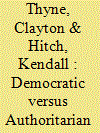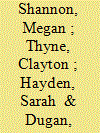|
|
|
Sort Order |
|
|
|
Items / Page
|
|
|
|
|
|
|
| Srl | Item |
| 1 |
ID:
175341


|
|
|
|
|
| Summary/Abstract |
Once considered artifacts of history, research on coups has burgeoned recently. Most studies focus on decisions to stage coups, considering factors like individual benefits, organizational interests, and government legitimacy. Less work considers what happens following coups. This article considers the political trajectory of states following coups. We argue that external reactions to coups play important roles in whether coup leaders move toward authoritarianism or democratic governance. When supported by external democratic actors, coup leaders have an incentive to push for elections to retain external support and consolidate domestic legitimacy. When condemned, coup leaders are apt to trend toward authoritarianism to assure their survival. We test our argument by considering how international responses to coups from states and international organizations influence coup states’ political trajectories. Our findings indicate that international actors play key roles in determining democracy levels of coup-born regimes.
|
|
|
|
|
|
|
|
|
|
|
|
|
|
|
|
| 2 |
ID:
160784


|
|
|
|
|
| Summary/Abstract |
Signals from domestic and international actors have been shown to influence the likelihood of coups. Coups remain difficult to predict and consequently leave policy makers in a reactive stance, but little systematic work assesses how these reactions influence long-term outcomes. We examine how reactions from domestic and international actors influence the duration of coup-born regimes, arguing that negative reactions will shorten leadership duration. We further probe these relationships by considering how signaling consistency, Cold War dynamics, and precoup relationships condition the influence of reactions on leadership duration. Tests use events data to capture domestic and international reactions and newly coded information on leadership to capture leader duration. Results indicate that international responses have a profound influence on leadership tenure, especially those from strong actors. We find tentative support that state reactions have the strongest effect during the Cold War, while international organizations matter the most afterward.
|
|
|
|
|
|
|
|
|
|
|
|
|
|
|
|
| 3 |
ID:
141652


|
|
|
|
|
| Summary/Abstract |
With ten attempts since 2010, coups d'état are surprisingly common events with vital implications for a state's political development. Aside from being disruptive internally, coups influence interstate relationships. Though coups have important consequences, we know little about how the international community responds to these upheavals. This paper explores what drives global actors to react to coups. Our theory differentiates between normative concerns (for example, protection of democracy) and material interests (for example, protection of oil exports) as potential determinants of international responses to coups. We argue that coups against democracies, coups after the Cold War, and coups in states heavily integrated into the international community are all more likely to elicit global reaction. Using newly collected data, we explore the number of signals that states and IOs send to coup states from 1950 to 2011. The analyses reveal that coups against democracies and wealthy states draw more attention. States react when democracies are challenged by coups, while IOs react to coups in Africa and coups during the post-Cold War period. We surprisingly find that heavy traders and oil-rich states do not necessarily receive more reaction, suggesting that international actors are more driven by normative concerns than material interests when reacting to coups.
|
|
|
|
|
|
|
|
|
|
|
|
|
|
|
|
|
|
|
|
|